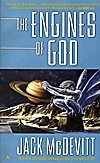 Published by Ace Books, 1994,
Published by Ace Books, 1994,
paperback, $6.50 ISBN 0-441-00284-6
419 pages
In the movie Contact, Jodi Foster's character waits for a message from space, in between begging for funding for her SETI (Search for Extraterrestial Intelligence) project. Sure enough, the equivalent of "Come here, Watson, I need you," filters through the antenna arrays and faster than you can say "Big Bang," it's off to meet the aliens. This is not unlike The Listeners from James Gunn.
In The Engines of God, this meet-the-aliens premise is slightly different. The year is 2202, Earth has explored the stars with faster-than-light travel, and a couple alien species have been found on other planets. One has WWI-era technology and is in the midst of a WWI-style world war to boot, and the other is an extinct species known as "The Monument Makers." The latter seems to have specialized in crafting immense statues across the galaxy with plaques none can decipher.
Meanwhile, the National Archeology Union is sending ships hither and thither to excavate old cities in the hope of picking up alien technology. You see, Earth is overpopulated, the ecosystem is failing, and there aren't any Earth-style planets in the neighborhood except the one engaged in WWI-style warfare, and another relatively vacant world.
The Engines of God is not about military fleets bent on conquest, but about a group of archeologists and scientists -- along with one stargip pilot -- bent on deciphering the mysteries of The Monument Makers. It is an exploration-style novel much in the vein of Inherit the Stars.
The group is hot on the trail of a sunken city on that vacant Earth-style planet, and of course, the equivalent of a Rosetta Stone. Meanwhile, a clock is ticking away--terraforming is about to begin, whether the group of archeologists is off or on the planet's surface.
McDevitt mixes human endeavors and the wonder of alien landscapes with verve and vigor. This plot moves right along and rivets your attention to the pages. His crisp style packs a visual impact of the beauty and danger of exploration, and wraps you in its embrace of the unknown.
Hutch raised a hand to block off the sun's glare, and sensed a presence near her left shoulder.
An eye.
Green and expressionless. It was mounted on a stalk." (p.93) Slowly, step by step, the group of scientists begins to gather the clues and unravel the mystery surrounding the Monument Makers. Across a number of sites on a number of planets and moons, McDevitt leads you into the realm of stellar archeologists--and the pressures from political opportunists and industry tycoons. Meanwhile, clues of a different nature keep reappearing with regularity.
If there was one aspect that bothered me, it was part of the premise. If Earth is dying, and FTL technology has been available for some time for public and private use, you would think that literally thousands of ships would be exploring the galaxy trying to find more Earth-like planets. I'm sure an "Earth First" party would be powerful, much the way many today believe we should abandon efforts to explore space, but when faced with extinction from a collapsing biosphere, don't you think that most would wake up to exploration? Space travel is advanced enough for chartered sightseeing flights, but not for locating new planets?
That minor nit, and it is minor, aside, The Engines of God brings an excellent sense of the unknown to your imagination, backed up with a feel for descriptive prose. The characters are well rounded, even if they seem a bit dopey during one exploration (don't these folks learn that planets have predators?), but the overall impact is one of wonder, amazement, and the very spirit of a search for answers.
This article appears in MagWeb (Magazine Web) on the Internet World Wide Web."A screech shattered the general tranquility. It echoed off the cliffs. The creatures froze. Then a rush began. Inland. Towards the pass. Several herded cubs before them. One adult went down. Hutch couldn't see what was happening to it; but it was struggling in shallow water, yelping pitiably, its limbs jerking and twitching.
Back to List of Book Reviews: Military Science Fiction
Back to Master Book Review List
Back to MagWeb Master Magazine List
© Copyright 1998 by Coalition Web, Inc.
Other military history articles and gaming articles are available at http://www.magweb.com